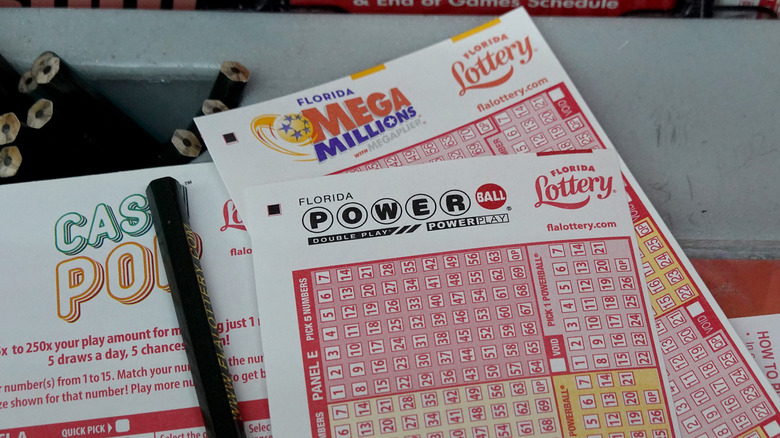Here's How Much The Average American Spends On Lottery Tickets Each Year
Although it's not exactly a sound budgeting strategy, many Americans enjoy the thrill of playing the lottery. Whether it's the instant gratification of scratch-off games or a numbers drawing like Powerball, consumers spend big on the chance to win even bigger. Indeed, the largest Powerball jackpot ever won was a $2.04 billion purse in November 2022. While that's extraordinary, there have also been eight additional Powerball or Mega Millions jackpots valued between $1 billion and $2 billion over the years. By comparison, the prizes awarded for winning scratch-off tickets are small potatoes. However, a Florida man did win $25 million on a lucky scratch ticket in April 2025.
So, just how much do people spend in the hopes of winning? According to the North American Association of State & Provincial Lotteries, Americans spent over $113.3 billion in 2024. With that said, some consumers spend considerably more than others when playing regularly, while others only purchase an occasional ticket when a jackpot reaches epic proportions. As well, residents of some states spent much more than others.
Massachusetts lottery players spend the most
In 2023, California and Florida tied for the two states with the greatest lottery sales, at approximately $9.2 billion each. At the other end of the spectrum, the western states of Montana, North Dakota, and Wyoming each had less than $100 million in lottery income for the year. However, viewing overall lottery sales per state doesn't paint the clearest picture, because some states have much larger populations than others.
On a per-capita basis, Massachusetts residents spent the most on lottery tickets, averaging $1,037 per person, according to 2022 census data that processed by Lottery USA. Some lottery officials in that state speculate that because Massachusetts' prizes are so much greater than neighboring states, residents of nearby states travel to purchase tickets there, which exaggerates the true per-capita spending.
Meanwhile, the second-highest lottery spending per-capita is another New England state. Residents of Rhode Island spend $627, per adult, on average. If you're wondering which states spend the least on lottery tickets per capita, it's North Dakota and Wyoming, which average $47 and $57 per person, respectively.
Investing is a better strategy
Low-income households spend significantly more money on lottery tickets than their affluent counterparts — up to 33 times more, in fact. Per The Economist, the poorest 1% of U.S. zip codes spend almost 5% of their income on purchasing lottery tickets, while the richest 1% only spend 0.15% of their income on the possibility of a longshot windfall.
An upside to playing the lottery, besides winning, its that approximately 30% of ticket sales are retained for worthy causes like education, infrastructure, and other things that states do with lottery money. Compared to casinos which typically retain about 10% of the money that's fed into slot machines. Looking at that from the inverse perspective, casinos actually pay more than lotteries percentage-wise, but what casinos do keep is retained as profit, not redistributed for public good like lottery earnings.
Finally, consider that if the national average spent on lotteries per month were instead invested in the S&P 500 index every month via dollar cost averaging for the past 20 years, players could expect a substantial pay out. Granted, it wouldn't be $2 billion, but the odds of "winning" with investing is considerably better.


